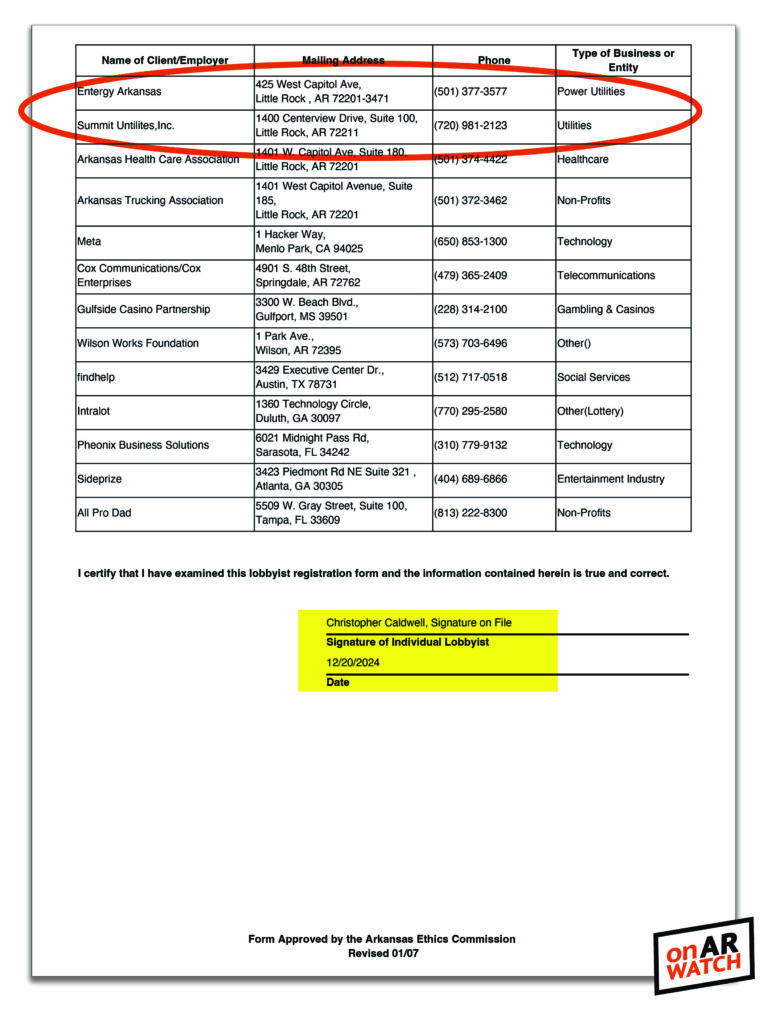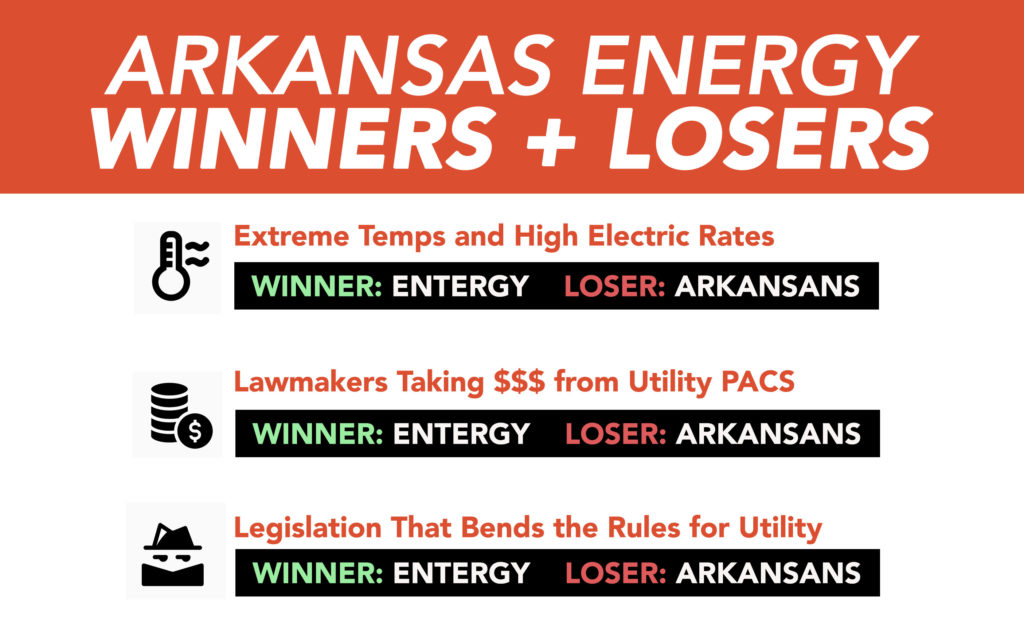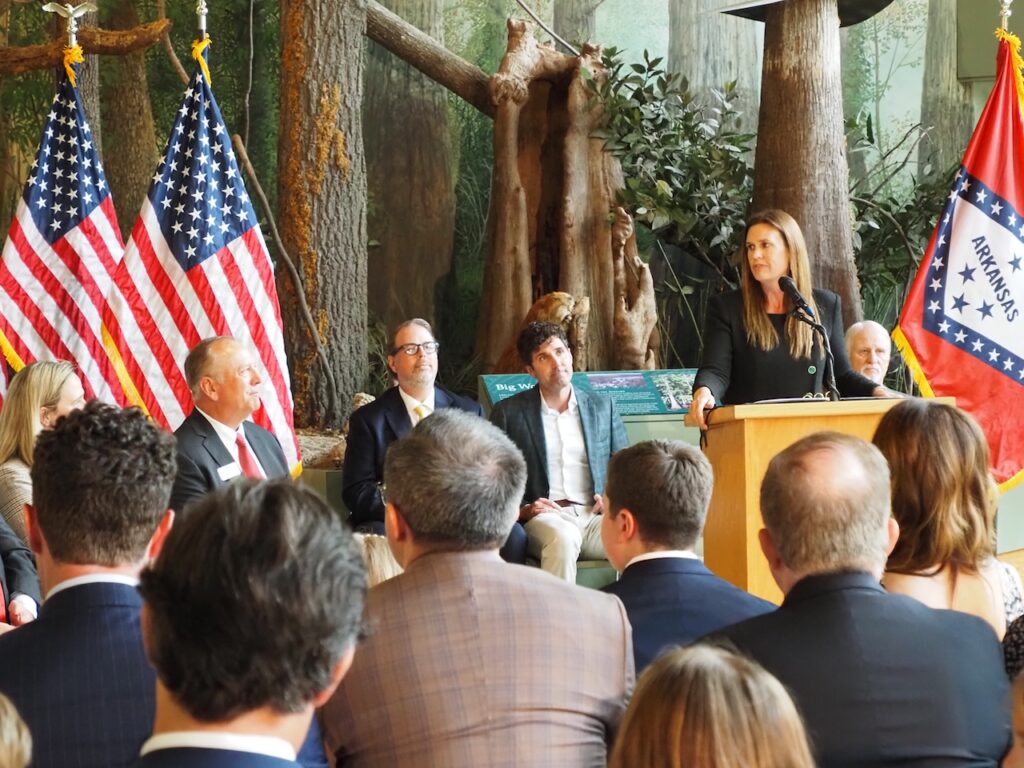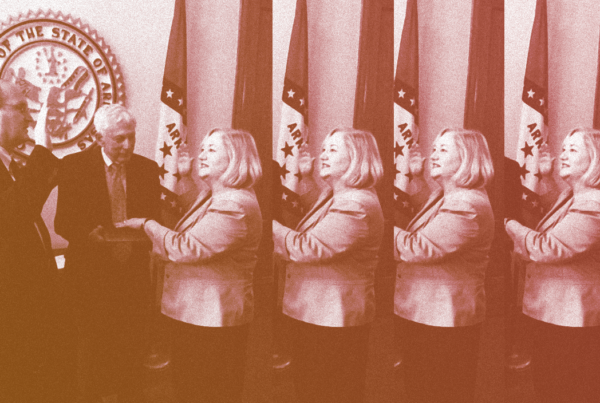Bad news for those who value government accountability and transparency
During routine conflict of interest research, On AR Watch uncovered that Chris Caldwell, the current Arkansas Game and Fish Commissioner, is also a registered lobbyist for energy and utility companies. A biggie on Caldwell’s list of clients is Entergy, Arkansas’s biggest utility company, which generates and distributes power across the state.
Caldwell’s name may sound familiar because he is also a top advisor to Governor Sarah Sanders. This trifecta of influence is pretty gross, and the glaring conflict of interest will negatively impact Arkansas’s natural environment.
Yes, our state ethics laws exist to prevent exactly this kind of conflict. Public officials are required to disclose financial interests and recuse themselves from decisions where a conflict exists.
Caldwell worked as a lobbyist prior to his appointment as Arkansas Game and Fish Commissioner (AGFC). But even after the announcement that he would take over the department, Caldwell remained a registered lobbyist in Arkansas.


Why this should alarm you
In cases where roles are so intertwined — like lobbying and regulatory oversight — recusal isn’t enough. Stepping aside during key votes doesn’t undo the influence a commissioner wields in broader discussions and policy-making. Let’s talk about why.
AGFC plays a pivotal role in protecting our state’s natural heritage. From regulating hunting and fishing to overseeing the conservation of wildlife habitats and public lands, the AGFC’s mission is to preserve Arkansas’s environment for future generations. So what happens when its commissioner also works on behalf of industries that directly impact Arkansas’s environment?
Well, there could be a lot of conflict of interest, inappropriate compromise, and a damning loss of public trust in our government.
Lobbyists in the energy and utility sectors advocate for projects like power plants, pipelines, and transmission lines at both the state and county levels. As you can guess, these projects have significant impacts on wetlands, wildlife, and public lands.
These projects often require permits and regulatory approvals, and the AGFC is involved in ensuring environmental protection is not sacrificed for industry convenience.
As a result, it is absolutely outrageous that a Game and Fish Commissioner is also a lobbyist for these industries. How can one advocate for industry interests while making impartial decisions about conservation and wildlife protection in Arkansas? One cannot.
If it’s not apparent yet, we’ll be straightforward: the conflict of interest overwhelmingly benefits Caldwell’s energy and utility clients.
Having a state commissioner in their client’s corner, someone with direct influence over conservation policies, opens the door for fast-tracked approvals, relaxed enforcement, and decisions made behind closed doors — all at the expense of Arkansans, many of whom are Entergy consumers and who also rely on the AGFC to protect our state’s natural resources.
Let’s consider a couple of ways this lobbyist/commissioner role could play out: Entergy, Caldwell’s client that has “a fleet of 28 active natural gas, oil, hydroelectric, and coal generating facilities,” wants to pipe oil near a protected wildlife area and applies for permits. Will the AGFC stand firm in protecting the land, or will the commissioner’s lobbying tilt the scales in favor of industry?
Say Entergy proposes expanding power lines through wetlands. Will Caldwell push for rigorous environmental impact assessments or will he help smooth the way for his client’s project?
(A brief aside: the top regulator for Entergy is the Public Service Commission — a state agency tasked with keeping utilities under control and preventing them from ripping off the public. Arkansas’s current Public Service Commissioner is Doyle Webb, the former chair of the Republican Party of Arkansas. What a tangled web we weave.)
What’s at stake
This whole thing is fundamentally inappropriate.

The commissioner’s role is to make impartial decisions that prioritize the conservation of Arkansas’s natural resources.
A lobbyist for energy and utility companies — whose projects often require regulatory approval that can impact wildlife and public lands — demonstrates a clear incentive to favor industry interests over our state’s environmental protection.
Caldwell’s dual role erodes public trust, undermines accountability, and compromises the very mission of the Arkansas Game and Fish Commission.
The role is also emblematic of a state government that has become synonymous with shady backroom decisions and a blatant disregard for the basic principles of state administrative propriety. By allowing individuals to hold such conflicting roles, our governor sends a troubling message to Arkansans: the rules meant to safeguard transparency and fairness are optional when political gain is involved.
Simply put, our state’s highest leaders do what they want, when they want. If this commissioner goes unchecked, it sets a dangerous precedent where industry insiders can hold the reins of government while advancing their own interests.
So, what do we do?
- Call for Resignation: Demand that the Commissioner Caldwell step down from one of these roles to eliminate the conflict.
- Contact the Arkansas Ethics Commission: Urge the Ethics Commission to investigate the situation and enforce state laws designed to prevent conflicts of interest.
- Stay Informed: Follow us for updates and calls to action on this issue as well as a myriad of others. Unfortunately, we’re never short on calls for more transparency and accountability in state government. On AR Watch has your back.






